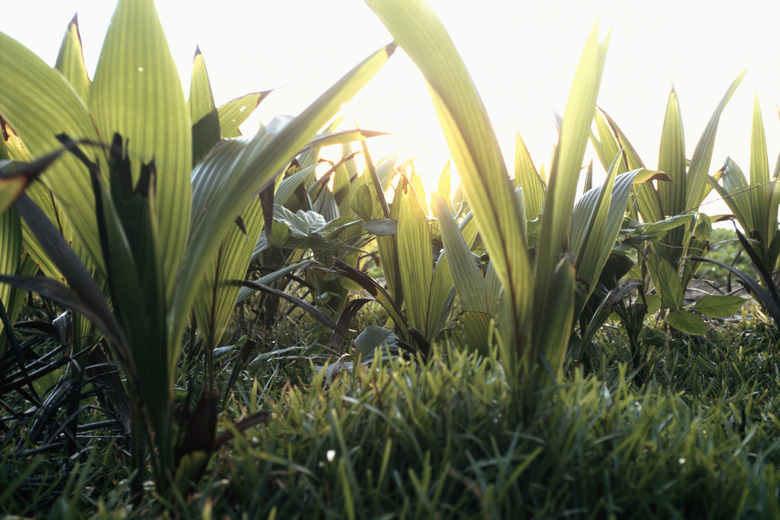Hidden Ginger Leaves Curling
Tropical plants are known for their dramatic foliage and often breathtaking flowers, as well as their love of heat and sunlight. But hidden gingers (Curcuma petiolata) generally require shade for their best performance, as the leaves curl when the plants get too much sun.
Tropical plants are known for their dramatic foliage and often breathtaking flowers, as well as their love of heat and sunlight. But hidden gingers (Curcuma petiolata) generally require shade for their best performance, as the leaves curl when the plants get too much sun. In a shady area, the plants sports broad, flattened leaves.
Sunlight Requirements
The defensive curling of hidden ginger leaves results from too many hours of direct sun during the hotter parts of the day. A bit of morning sun is fine, but as the day progresses, the light becomes too intense for hidden gingers, which respond by rolling their leaves down and inward to reduce the overall surface area exposed to the sun. Though hidden gingers are tropical plants, and grow in U.S. Department of Agriculture plant hardiness zones 8 through 10, they are understory plants in their native habitats. They prefer part shade, no more than three hours in the morning, to all-day shade with bright indirect light, which results in rich, glossy foliage and better bloom appearance.
- Tropical plants are known for their dramatic foliage and often breathtaking flowers, as well as their love of heat and sunlight.
- A bit of morning sun is fine, but as the day progresses, the light becomes too intense for hidden gingers, which respond by rolling their leaves down and inward to reduce the overall surface area exposed to the sun.
Normal Plant Appearance
Hidden gingers typically reach 2 to 3 feet tall, most of that accounted for by the wide bananalike leaves which arise from the plant on long, fleshy stalks. Healthy leaves should be lightly pleated, bright green or edged in white, depending on the variety. These leaves will somewhat hide the flowers once the shell-pink flowers appear. Overexposed plants with curled leaves will probably soldier on, but certainly will not look as full or healthy as those growing in more shade — the leaves may develop patchy, sunburned spots.
Dormancy
As hidden gingers approach dormancy for winter, the leaves begin to yellow and curl before turning brown and shriveling away. This is normal, and cannot be stopped or delayed even in a greenhouse. Though they are hardier than other types of gingers, if you live in USDA zone 8, it's best to lift hidden ginger rhizomes for storage in a peat-filled pot. If you live in USDA zone 9, mulch heavily. In USDA zone 10, the plants don't need additional care. Don't water during the dormant period, as the rhizomes rot easily in overly moist soils.
- Hidden gingers typically reach 2 to 3 feet tall, most of that accounted for by the wide bananalike leaves which arise from the plant on long, fleshy stalks.
- Overexposed plants with curled leaves will probably soldier on, but certainly will not look as full or healthy as those growing in more shade — the leaves may develop patchy, sunburned spots.
Curled Leaf Impacts
Curled leaves on a plant growing in too much sun is generally only a cosmetic issue and should not seriously impact the health of the plant. The plant may flower less frequently or produce smaller flowers when grown in too much sun. If your hidden gingers frequently and consistently have curled leaves, dig them up and replant them in a better spot in fall. While it is OK to leave the plant where it is, the curled leaves detract from the plants' appearance.
References
- Missouri Botanical Garden: Curcuma Petiolata
- North Carolina State University: Plant of the Month: Hidden Cone Ginger
- Identification, Selection, and Use of Southern Plants: For Landscape Design; Neil G. Odenwald and James R. Turner
- Texas A&M University: Creating the Tropical Look
- Walter Reeves, The Georgia Gardener: Hidden Ginger Identification
- Pacific Bulb Society: Curcuma
- Plant Delights Nursery: Curcuma — Hidden Cone Gingers For the Temperate Garden
